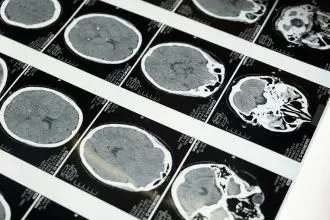A brain injury is any alteration in brain function, or other evidence of brain pathology, caused by either an external force or an internal medical condition. Because the brain controls every aspect of thought, movement, memory, and personality, even a minor injury can disrupt daily life. At the most severe end, brain injuries can lead to permanent disability or loss of independence.
Understanding what brain injuries are, how they happen, and what recovery looks like provides a foundation for patients, families, and caregivers facing these challenges. This guide offers a comprehensive overview, linking to more detailed sections for those who need in-depth information.
Why Brain Injuries Matter
Brain injuries are a leading cause of disability worldwide. Millions of people each year sustain concussions, traumatic injuries, or acquired injuries from medical conditions such as stroke. Some recover fully, while others experience lasting effects that impact work, relationships, and overall quality of life.
In the United States alone, the CDC estimates over 2.8 million traumatic brain injury-related emergency visits, hospitalizations, and deaths occur annually. Many more mild injuries go unreported. The widespread impact makes brain injury awareness a public health priority.
How Brain Injuries Happen
Brain injuries are classified into two main groups:
- Traumatic Brain Injuries (TBI): Caused by an external physical force. Common scenarios include falls, motor vehicle crashes, sports injuries, military blasts, or assaults. TBIs may be closed (the skull stays intact) or penetrating (an object pierces the skull and brain tissue).
- Acquired Brain Injuries (ABI): Not caused by external trauma. These occur when medical conditions disrupt oxygen supply, blood flow, or cellular integrity. Examples include stroke, brain tumors, infections like meningitis, or hypoxic events following cardiac arrest.
Both types can overlap in their effects. For example, a person with a stroke and a person in a car accident may both develop memory problems, speech difficulties, and motor impairment, even though the causes differ.
Types of Brain Injury
While “brain injury” is an umbrella term, several conditions fall within it. Each has unique features:
- Concussion / Mild TBI – Often caused by falls or sports. Symptoms may include headache, dizziness, or concentration problems. Although most resolve, repeated concussions raise concern for chronic effects.
- Moderate to Severe TBI – These injuries involve longer loss of consciousness, visible damage on scans, and higher risk of long-term disability.
- Acquired Brain Injury – Includes stroke, tumors, brain infections, and anoxic injuries (oxygen deprivation).
- Penetrating Injuries – Caused by bullets, shrapnel, or sharp objects entering the brain.
Each type is explored in depth in our Types of Brain Injuries section.
Symptoms and Warning Signs
Symptoms vary widely depending on the injury’s type, severity, and location. Some appear immediately; others emerge days or weeks later. Common categories include:
- Physical: Headache, nausea, dizziness, blurred vision, seizures.
- Cognitive: Confusion, memory loss, difficulty concentrating, slowed processing.
- Emotional/Behavioral: Irritability, depression, impulsivity, mood swings.
- Sensory: Sensitivity to light or sound, ringing in the ears, altered taste or smell.
Families should seek medical attention if someone shows red flags like persistent vomiting, worsening headache, confusion, slurred speech, or loss of consciousness. More detail is covered in Symptoms & Warning Signs of Brain Injury.
Diagnosis and Tests
Accurate diagnosis helps determine the best course of treatment. Clinicians may use:
- Neurological Exams: Assessing reflexes, coordination, speech, and mental status.
- Imaging: CT scans are used in emergencies to detect bleeding, while MRIs reveal subtle damage.
- Neuropsychological Testing: Evaluates memory, attention, language, and problem-solving skills.
- Biomarkers & Emerging Tools: Research is exploring blood tests that may detect brain injury more quickly.
For more on this process, see How Doctors Diagnose a Brain Injury.
Recovery and Prognosis
No two brain injury recoveries are identical. Some people bounce back quickly from mild injuries, while others with severe damage may require lifelong support. Key factors influencing recovery include:
- The type and severity of the injury
- The age and health of the individual
- Speed and quality of medical care
- Access to rehabilitation services
Rehabilitation is often multidisciplinary, combining physical therapy, occupational therapy, speech-language therapy, cognitive training, and psychological support. Learn more in our section on Recovery Stages After Brain Injury.
Complications and Long-Term Effects
Brain injuries can lead to secondary complications such as:
- Post-concussion syndrome (lingering symptoms after a mild injury)
- Post-traumatic epilepsy (seizures after TBI)
- Hydrocephalus (fluid buildup in the brain)
- Emotional and behavioral disorders (anxiety, depression, personality changes)
- Increased risk of neurodegenerative diseases in severe or repeated injuries
Understanding these risks helps patients and families monitor symptoms and seek help early.
Risk Factors
While brain injuries can happen to anyone, some groups face higher risk:
- Older adults (falls are the leading cause of TBI hospitalizations)
- Children and adolescents (sports and playground accidents)
- Military personnel and veterans (blast-related injuries)
- Athletes in contact sports (football, hockey, boxing)
Awareness and prevention strategies — like helmets, fall-proofing homes, and concussion protocols — can reduce incidence.
Prevention of Brain Injuries
Although not all brain injuries can be prevented, steps can reduce risk:
- Wearing seatbelts and helmets
- Preventing falls with home safety modifications
- Following sports safety rules
- Managing health conditions like high blood pressure to lower stroke risk
- Seeking prompt care for infections that may affect the brain
Public awareness campaigns play a vital role in reducing preventable injuries.
Why Early Intervention Matters
Prompt recognition and treatment improve outcomes at every level. For concussions, rest and proper monitoring can prevent worsening symptoms. For severe injuries, rapid emergency care can save lives. Rehabilitation begun early often leads to better recovery of function.
Families who understand what brain injuries are—and how they can evolve—are better prepared to advocate for the right care and resources.
Conclusion
A brain injury is not a single disorder but a spectrum of conditions that affect the brain in different ways. From mild concussions to life-threatening trauma or acquired injuries, the impact can be profound. Yet with advances in medical research, rehabilitation, and community support, many survivors regain independence and quality of life.
The journey begins with awareness. By learning what brain injuries are, families and professionals alike can recognize the signs, respond quickly, and build pathways toward recovery.







